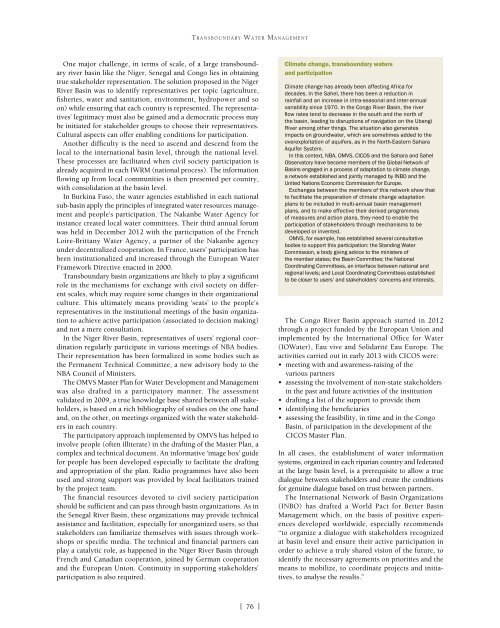222893e
222893e
222893e
You also want an ePaper? Increase the reach of your titles
YUMPU automatically turns print PDFs into web optimized ePapers that Google loves.
TRANSBOUNDARY WATER MANAGEMENTOne major challenge, in terms of scale, of a large transboundaryriver basin like the Niger, Senegal and Congo lies in obtainingtrue stakeholder representation. The solution proposed in the NigerRiver Basin was to identify representatives per topic (agriculture,fisheries, water and sanitation, environment, hydropower and soon) while ensuring that each country is represented. The representatives’legitimacy must also be gained and a democratic process maybe initiated for stakeholder groups to choose their representatives.Cultural aspects can offer enabling conditions for participation.Another difficulty is the need to ascend and descend from thelocal to the international basin level, through the national level.These processes are facilitated when civil society participation isalready acquired in each IWRM (national process). The informationflowing up from local communities is then presented per country,with consolidation at the basin level.In Burkina Faso, the water agencies established in each nationalsub-basin apply the principles of integrated water resources managementand people’s participation. The Nakanbe Water Agency forinstance created local water committees. Their third annual forumwas held in December 2012 with the participation of the FrenchLoire-Brittany Water Agency, a partner of the Nakanbe agencyunder decentralized cooperation. In France, users’ participation hasbeen institutionalized and increased through the European WaterFramework Directive enacted in 2000.Transboundary basin organizations are likely to play a significantrole in the mechanisms for exchange with civil society on differentscales, which may require some changes in their organizationalculture. This ultimately means providing ‘seats’ to the people’srepresentatives in the institutional meetings of the basin organizationto achieve active participation (associated to decision making)and not a mere consultation.In the Niger River Basin, representatives of users’ regional coordinationregularly participate in various meetings of NBA bodies.Their representation has been formalized in some bodies such asthe Permanent Technical Committee, a new advisory body to theNBA Council of Ministers.The OMVS Master Plan for Water Development and Managementwas also drafted in a participatory manner. The assessmentvalidated in 2009, a true knowledge base shared between all stakeholders,is based on a rich bibliography of studies on the one handand, on the other, on meetings organized with the water stakeholdersin each country.The participatory approach implemented by OMVS has helped toinvolve people (often illiterate) in the drafting of the Master Plan, acomplex and technical document. An informative ‘image box’ guidefor people has been developed especially to facilitate the draftingand appropriation of the plan. Radio programmes have also beenused and strong support was provided by local facilitators trainedby the project team.The financial resources devoted to civil society participationshould be sufficient and can pass through basin organizations. As inthe Senegal River Basin, these organizations may provide technicalassistance and facilitation, especially for unorganized users, so thatstakeholders can familiarize themselves with issues through workshopsor specific media. The technical and financial partners canplay a catalytic role, as happened in the Niger River Basin throughFrench and Canadian cooperation, joined by German cooperationand the European Union. Continuity in supporting stakeholders’participation is also required.Climate change, transboundary watersand participationClimate change has already been affecting Africa fordecades. In the Sahel, there has been a reduction inrainfall and an increase in intra-seasonal and inter-annualvariability since 1970. In the Congo River Basin, the riverflow rates tend to decrease in the south and the north ofthe basin, leading to disruptions of navigation on the UbangiRiver among other things. The situation also generatesimpacts on groundwater, which are sometimes added to theoverexploitation of aquifers, as in the North-Eastern SaharaAquifer System.In this context, NBA, OMVS, CICOS and the Sahara and SahelObservatory have became members of the Global Network ofBasins engaged in a process of adaptation to climate change,a network established and jointly managed by INBO and theUnited Nations Economic Commission for Europe.Exchanges between the members of this network show thatto facilitate the preparation of climate change adaptationplans to be included in multi-annual basin managementplans, and to make effective their derived programmesof measures and action plans, they need to enable theparticipation of stakeholders through mechanisms to bedeveloped or invented.OMVS, for example, has established several consultativebodies to support this participation: the Standing WaterCommission, a body giving advice to the ministers ofthe member states; the Basin Committee; the NationalCoordinating Committees, an interface between national andregional levels; and Local Coordinating Committees establishedto be closer to users’ and stakeholders’ concerns and interests.The Congo River Basin approach started in 2012through a project funded by the European Union andimplemented by the International Office for Water(IOWater), Eau vive and Solidarité Eau Europe. Theactivities carried out in early 2013 with CICOS were:• meeting with and awareness-raising of thevarious partners• assessing the involvement of non-state stakeholdersin the past and future activities of the institution• drafting a list of the support to provide them• identifying the beneficiaries• assessing the feasibility, in time and in the CongoBasin, of participation in the development of theCICOS Master Plan.In all cases, the establishment of water informationsystems, organized in each riparian country and federatedat the large basin level, is a prerequisite to allow a truedialogue between stakeholders and create the conditionsfor genuine dialogue based on trust between partners.The International Network of Basin Organizations(INBO) has drafted a World Pact for Better BasinManagement which, on the basis of positive experiencesdeveloped worldwide, especially recommends“to organize a dialogue with stakeholders recognizedat basin level and ensure their active participation inorder to achieve a truly shared vision of the future, toidentify the necessary agreements on priorities and themeans to mobilize, to coordinate projects and initiatives,to analyse the results.”[ 76 ]


